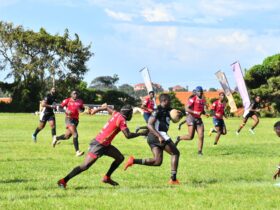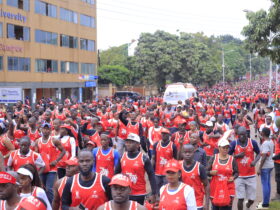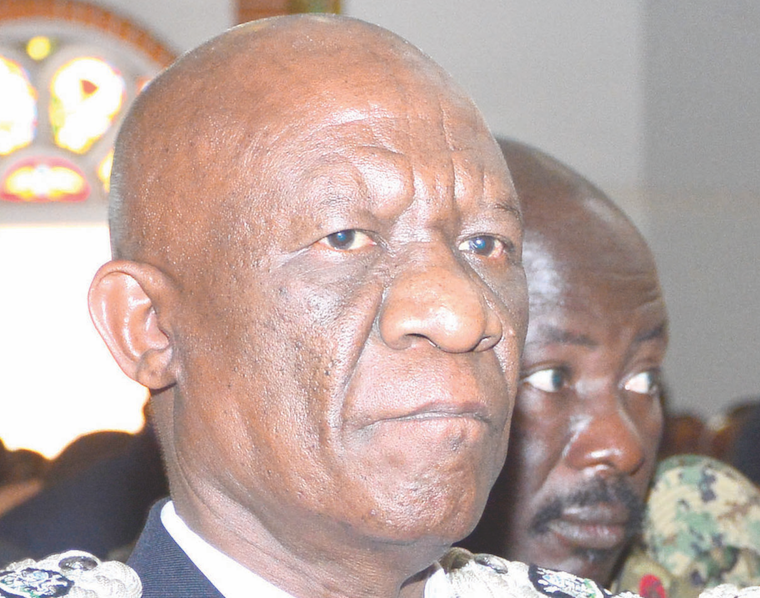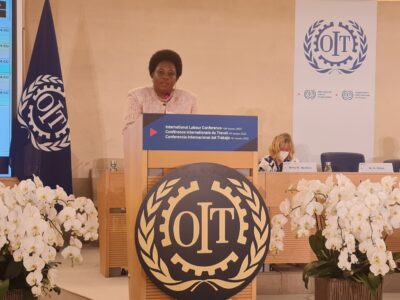The wanton torture of suspects in custody has caused many disabilities to victims over the years, prompting growing public calls to ban the practice – and revived debate over its effectiveness in extracting information.
In her most strident language yet on the rampant torture of suspects by security forces, Jane Frances ABODO, the new director of Public Prosecutions, has warned that going forward, the directorate will investigate every torture allegation reported to her office.
And “Shall prosecute suspected perpetrators of torture and other forms of cruel, inhumane and degrading treatment against whom there’s sufficient evidence.”
Interviewed for a comment, Police spokesman Fred Enanga said the DPP’s warning is not new but rather an added voice to the force’s effort to fight all forms of torture.
“Our stand on torture is very clear. We are an institution that doesn’t condone torture in all forms and use of excessive force,” he said in a telephone interview last Friday.
“Our officers know very well that use of excessive force and abuse of human rights attracts sanctions. The DPP’s warning is not new; rather, it’s an added voice to our efforts to stamp out torture. We are more than ready to have offenders arraigned before courts of law…”
He said police has used its human rights department to disseminate materials about the Prevention and Prohibition Torture Act among officers and teach them to respect human rights. He said police is no longer associated with safe houses.
In the three-page statement issued on June 20, ABODO said the office of the director of Public Prosecutions, Uganda, “Condemns the use of torture and other cruel, inhumane or degrading treatment as interrogation strategies and calls on all security agencies including the Uganda Police Force (UPF), Internal Security Organization (ISO) [and] External Security Organisation (ESO) to explicitly ban the use of such treatment and enforce all laws and regulations prohibiting its use.”
She said torture and other forms of cruel and degrading treatment of suspects are a violation of the law and are “ineffective as a means of extracting reliable information.”
ABODO insists that, “…these forms of treatment negatively impact the physical and mental health of suspects. They have far-reaching consequences for Uganda because they damage its reputation and undermine its credibility…”
The DPP said she was forced to state her office’s position after receiving several complaints and outright acrimony from various stakeholders.
Security agencies, she said, are required to observe a wide range of international and national treaties and conventions and laws that prohibit torture and other cruel, inhumane and degrading treatment, and the prohibition is absolute under all circumstances.
Nicholas Opiyo, a human rights lawyer, said in a tweet on June 12 that for the DPP’s warning to have some bite, it must be followed by, “Criminal prosecution of those involved in acts of torture – where the @ODPPUGANDA is overwhelmed allowing & supporting private prosecutions.
“And declining to prosecute cases where suspects have been tortured.”
In response to Opiyo’s tweet, Isaac Ssemakadde, a lawyer, said, “Aren’t you aware that this language was deliberately left out of that @ODPPUGANDA doc, which btw was not addressed to Ugandans but rather foreigners “donors” who needed this lukewarm affirmation by the newcomer of mundane principles? No policy shift, just lip service.”
Before he died last year, Meddie Sozzi Kaggwa, then chairman of the Uganda Human Rights Commission (UHRC), used a June 18, 2019 press conference ahead of the International UN Day in Support of Victims of Torture, to nudge government to clear compensation for victims of torture. Then the pending compensation bill totalled Shs 5 billion.
Kaggwa said the money keeps accumulating over the years, yet some victims die without being compensated.
Kaggwa asked the finance ministry to clear the outstanding compensation awards including awards to suspects in the killing of former Police Spokesperson AIGP Andrew Felix Kaweesi. They got Shs 200m following confirmation of their torture while in detention at the closed Nalufenya prison in Jinja.
“Ministry of Finance should fast-track payment of compensation awards ordered for torture survivors by both UHRC tribunal and mainstream courts of law,” Kaggwa said.
UHRC said it was unfair for a torture victim to fail to secure a reward that is often as little as Shs 1m. The African Centre for Rehabilitation and Treatment of Torture Victims (ACTV), registers more than 1,000 cases of torture every year, according to one organization official, Samuel Nsubuga. He said between 2015 and 2018, ACTV provided rehabilitation and counseling services to 4,528 torture survivors, majority of who were men.
Court judgment
Last month in two separate judgments, judges made it clear that the old order of human rights abuses in the police force will no longer go unpunished. The judgments spotlighted one theme: errant officers will now be required to personally incur the cost of compensation in the event of an award by court.
In the past, public officers, more-so security officers, tortured citizens and abused their rights with impunity, knowing that when push came to shove, it would be the taxpayers to pay for their sins. Not anymore.
Now the Human Rights (Enforcement) Act 2019 is beginning to bite police officers where it hurts most – their personal purse. Strangely, the inspector general of police, Martins Okoth Ochola, who in 2019 warned his officers against transgressing the law on human rights, was asked to pay for court costs after the judge ruled that he illegally stopped Bobi Wine’s Kyarenga concert.
In the case, Abbey Musinguzi T/A Abtex productions and Bajo Events and Marketing Agency Ltd v. The inspector general of police and attorney general, Justice Esta Nambayo found that the decision-making process and the decision itself of the inspector general of police taken on April 19, 2019, indefinitely stopping the event managers from organizing the ‘Kyarenga Extra Concerts’ at One Love Beach Busabaala, Lira, Gulu and Arua was illegal, ultra vires, irrational, unreasonable and an abuse of the police’s powers. And for that reason, the judge ordered the inspector general of police to pay the cost of application.
In July 2019, when the human rights law was enacted, Ochola wrote to all police units and warned them about the strict repercussions of violating human rights.
“Be informed that a new law, The Human Rights (Enforcement) Act 2019, is now in place. Going forward, the entrenchment of human rights in police work will never be an option…” Ochola wrote.
“The common human rights violations by police that have been documented over the years include, but not limited to, detention of suspects beyond 48 hours, torture, denial of a right to a fair hearing …” Ochola illustrated.
“Important to note is that responsible officers will now be required to personally incur the cost of compensation in the event of an award by court…” the circular explained.
In the recent human rights violation case, Right Trumpets, Ampiire Aisha and Nansubuga v. AIGP Asan Kasingye and 13 others, the judge Margaret Mutonyi, has held several police officers personally liable for torturing and violating the rights of inmates under police custody at Naggalama police station.
Opposition
Meanwhile, a coalition of opposition politicians petitioned the United Nations (UN), seeking its intervention in the alleged torture of its leaders while they gave out food to hungry people at the start of the Covid-19 lockdown restrictions.
While the opposition politicians; Robert Kyagulanyi aka Bobi Wine, Dr Kizza Besigye, Nobert Mao (DP), Asumani Basalirwa (Jeema) and counsel Peter Walubiri (UPC), were petitioning the secretary general of the UN, Antonio Gutteres, tortured Mityana municipality MP Francis Zaake was petitioning High Court over torture by security personnel.
Through his lawyers of Kiiza & Mugisha Advocates, MP Zaake is seeking for unspecified compensation from individual police and military officers and government.
The individually sued officers are Abel Kandiiho, the head of Chieftaincy of Military Intelligence (CIM), Alex Mwine, the Mityana district police commander; Elly Womanya, the commandant of the Special Investigations Unit (SIU); Twesigye Hamdani; Musa Walugembe, the officer in charge of SIU; and Haruna Mulungi Nsamba.
In his court documents, the 29-year-old legislator contends that on April 19 this year as he was taking a shower at his upcountry home in Mityana district when a combined security detail of police and military, jumped over his wall fence and brutally arrested him.
****
Observer












